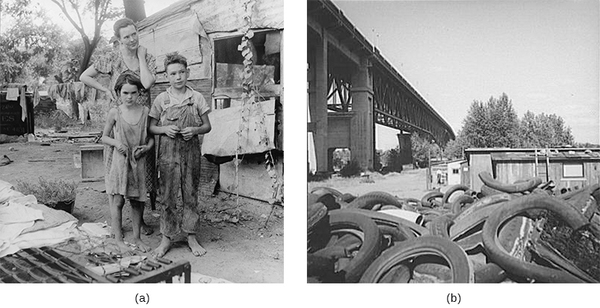| << Chapter < Page | Chapter >> Page > |
Hoover’s steadfast resistance to government aid cost him the reelection and has placed him squarely at the forefront of the most unpopular presidents, according to public opinion, in modern American history. His name became synonymous with the poverty of the era: “Hoovervilles” became the common name for homeless shantytowns ( [link] ) and “Hoover blankets” for the newspapers that the homeless used to keep warm. A “Hoover flag” was a pants pocket—empty of all money—turned inside out. By the 1932 election, hitchhikers held up signs reading: “If you don’t give me a ride, I’ll vote for Hoover.” Americans did not necessarily believe that Hoover caused the Great Depression. Their anger stemmed instead from what appeared to be a willful refusal to help regular citizens with direct aid that might allow them to recover from the crisis.

Desperation and frustration often create emotional responses, and the Great Depression was no exception. Throughout 1931–1932, companies trying to stay afloat sharply cut worker wages, and, in response, workers protested in increasingly bitter strikes. As the Depression unfolded, over 80 percent of automotive workers lost their jobs. Even the typically prosperous Ford Motor Company laid off two-thirds of its workforce.
In 1932, a major strike at the Ford Motor Company factory near Detroit resulted in over sixty injuries and four deaths. Often referred to as the Ford Hunger March , the event unfolded as a planned demonstration among unemployed Ford workers who, to protest their desperate situation, marched nine miles from Detroit to the company’s River Rouge plant in Dearborn. At the Dearborn city limits, local police launched tear gas at the roughly three thousand protestors, who responded by throwing stones and clods of dirt. When they finally reached the gates of the plant, protestors faced more police and firemen, as well as private security guards. As the firemen turned hoses onto the protestors, the police and security guards opened fire. In addition to those killed and injured, police arrested fifty protestors. One week later, sixty thousand mourners attended the public funerals of the four victims of what many protesters labeled police brutality. The event set the tone for worsening labor relations in the U.S.
Farmers also organized and protested, often violently. The most notable example was the Farm Holiday Association. Led by Milo Reno, this organization held significant sway among farmers in Iowa, Nebraska, Wisconsin, Minnesota, and the Dakotas. Although they never comprised a majority of farmers in any of these states, their public actions drew press attention nationwide. Among their demands, the association sought a federal government plan to set agricultural prices artificially high enough to cover the farmers’ costs, as well as a government commitment to sell any farm surpluses on the world market. To achieve their goals, the group called for farm holidays , during which farmers would neither sell their produce nor purchase any other goods until the government met their demands. However, the greatest strength of the association came from the unexpected and seldom-planned actions of its members, which included barricading roads into markets, attacking nonmember farmers, and destroying their produce. Some members even raided small town stores, destroying produce on the shelves. Members also engaged in “penny auctions,” bidding pennies on foreclosed farm land and threatening any potential buyers with bodily harm if they competed in the sale. Once they won the auction, the association returned the land to the original owner. In Iowa, farmers threatened to hang a local judge if he signed any more farm foreclosures. At least one death occurred as a direct result of these protests before they waned following the election of Franklin Roosevelt.

Notification Switch
Would you like to follow the 'U.s. history' conversation and receive update notifications?